2024年中考英语动词分类Classification of Verb课件(共59张PPT)
文档属性
| 名称 | 2024年中考英语动词分类Classification of Verb课件(共59张PPT) |
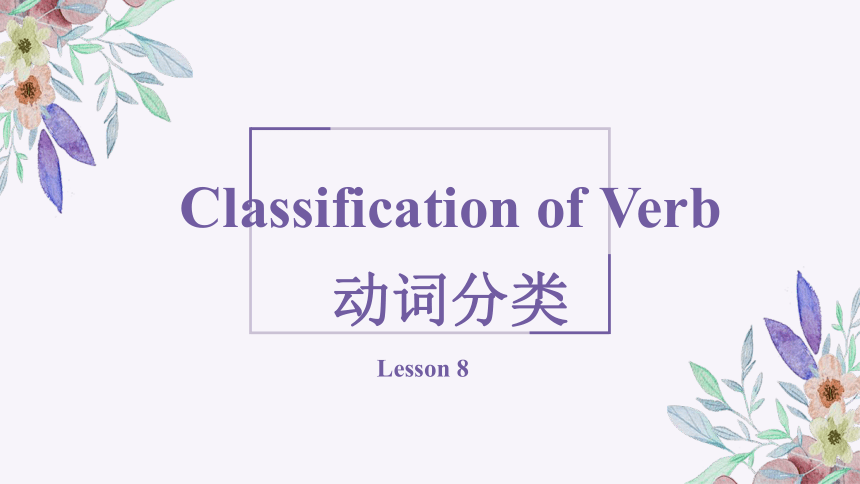
|
|
| 格式 | pptx | ||
| 文件大小 | 8.0MB | ||
| 资源类型 | 教案 | ||
| 版本资源 | 通用版 | ||
| 科目 | 英语 | ||
| 更新时间 | 2023-12-05 11:11:13 | ||
图片预览


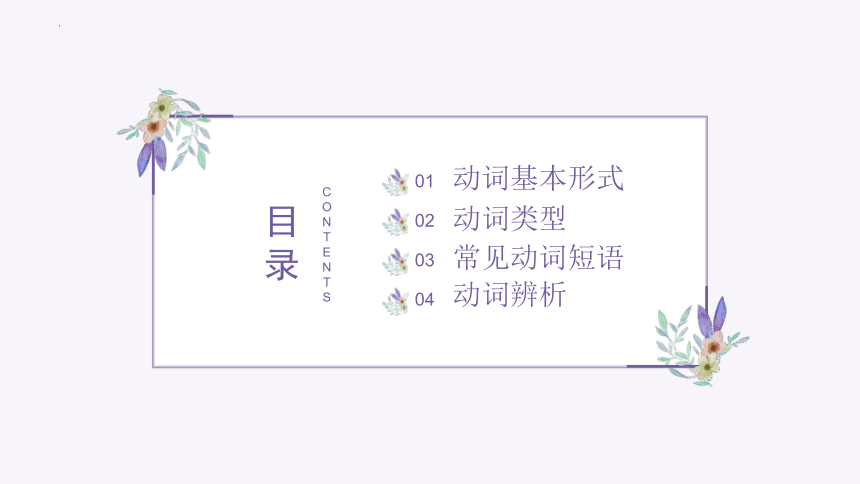
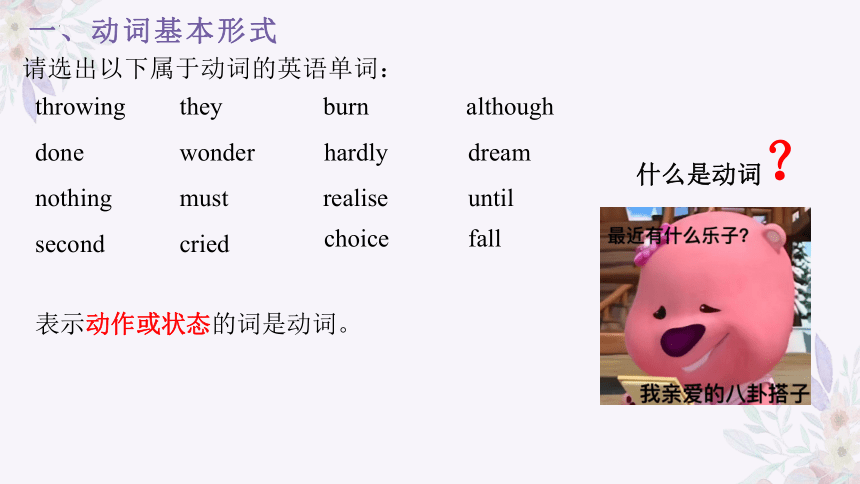

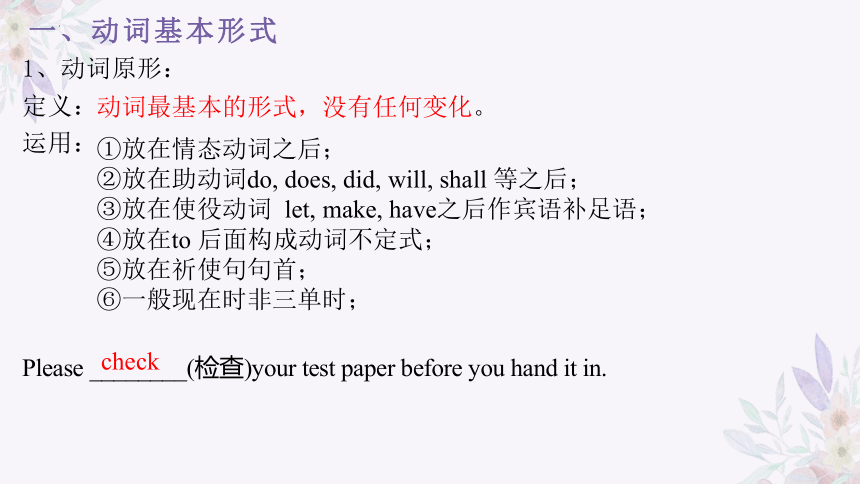
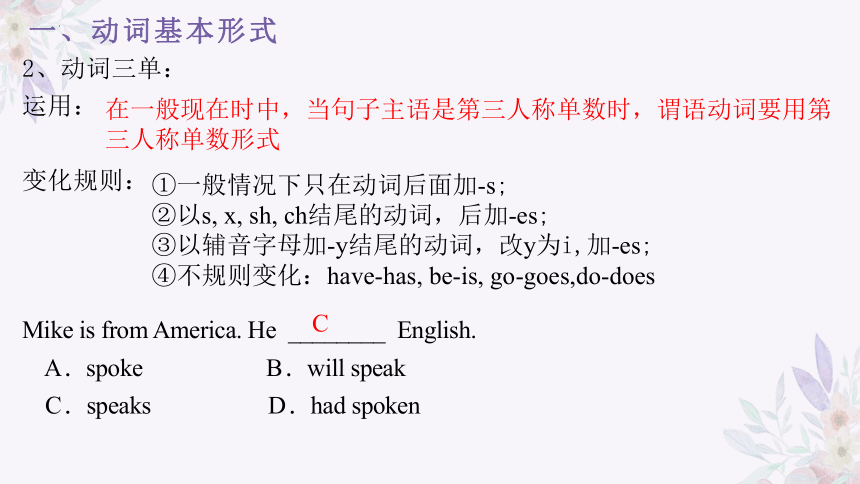
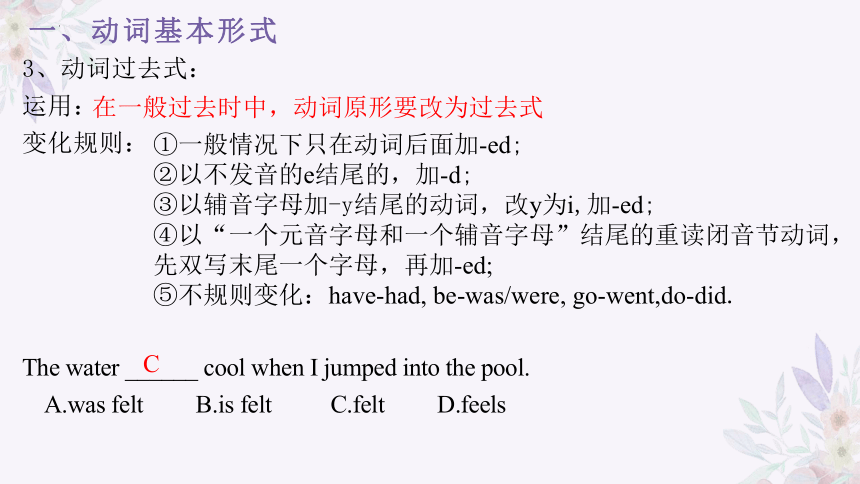

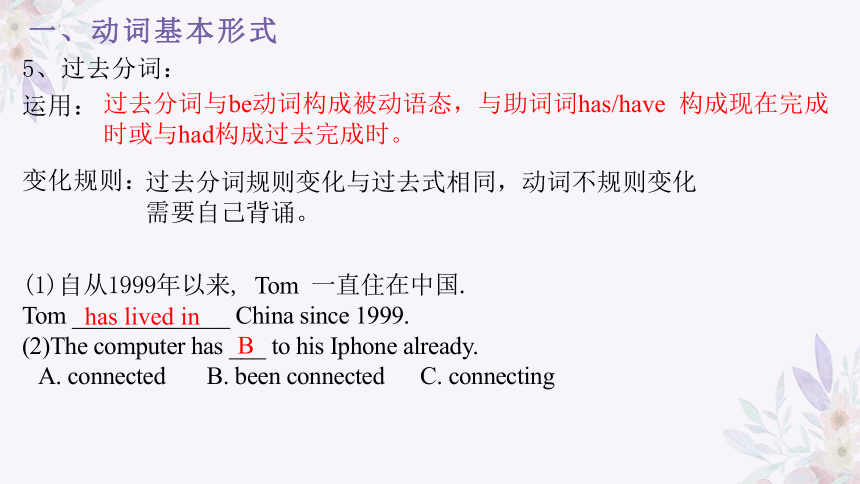
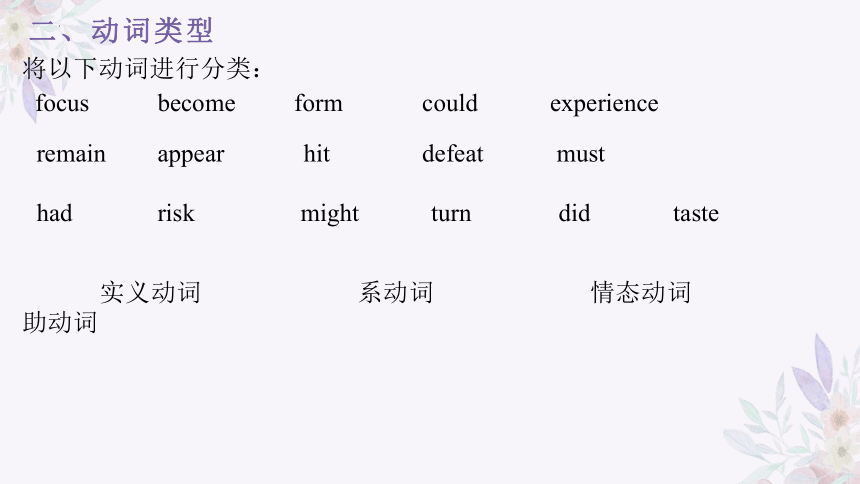

文档简介
(共59张PPT)
Classification of Verb
动词分类
Lesson 8
Classification of Verb
01
动词基本形式
动词类型
常见动词短语
动词辨析
02
03
04
CONTENTS
目录
请选出以下属于动词的英语单词:
一、动词基本形式
throwing
they
burn
although
done
wonder
hardly
dream
nothing
must
realise
until
second
cried
choice
fall
什么是动词?
表示动作或状态的词是动词。
一、动词基本形式
动词基本形式有什么?
动词的基本形式
01
动词原形
02
第三人称单数
03
过去式
04
现在分词
05
过去分词
1、动词原形:
定义:
运用:
Please ________(检查)your test paper before you hand it in.
一、动词基本形式
动词最基本的形式,没有任何变化。
①放在情态动词之后;
②放在助动词do, does, did, will, shall 等之后;
③放在使役动词 let, make, have之后作宾语补足语;
④放在to 后面构成动词不定式;
⑤放在祈使句句首;
⑥一般现在时非三单时;
check
2、动词三单:
运用:
变化规则:
Mike is from America. He ________ English.
A.spoke B.will speak
C.speaks D.had spoken
一、动词基本形式
在一般现在时中,当句子主语是第三人称单数时,谓语动词要用第三人称单数形式
①一般情况下只在动词后面加-s;
②以s, x, sh, ch结尾的动词,后加-es;
③以辅音字母加-y结尾的动词,改y为i,加-es;
④不规则变化:have-has, be-is, go-goes,do-does
C
3、动词过去式:
运用:
变化规则:
The water ______ cool when I jumped into the pool.
A.was felt B.is felt C.felt D.feels
一、动词基本形式
在一般过去时中,动词原形要改为过去式
①一般情况下只在动词后面加-ed;
②以不发音的e结尾的,加-d;
③以辅音字母加-y结尾的动词,改y为i,加-ed;
④以“一个元音字母和一个辅音字母”结尾的重读闭音节动词,先双写末尾一个字母,再加-ed;
⑤不规则变化:have-had, be-was/were, go-went,do-did.
C
4、现在分词:
运用:
变化规则:
The classroom is too quiet, because students______ a test.
A.was have B.having C.are having D.had
一、动词基本形式
现在分词与be动词构成进行时态,现在进行时或过去进行时;
①一般情况下只在动词后面加-ing;
②以不发音的e结尾的,先去掉e,再加-ing;
③以“一个元音字母和一个辅音字母”结尾的重读闭音节动词,先双写末尾一个字母,再加-ing;
④以ie结尾的名词,一般将ie改为y,再加-ing. 如lie, tie, die;
C
5、过去分词:
运用:
变化规则:
(1)自从1999年以来, Tom 一直住在中国.
Tom _____________ China since 1999.
(2)The computer has ___ to his Iphone already.
A. connected B. been connected C. connecting
一、动词基本形式
过去分词与be动词构成被动语态,与助词词has/have 构成现在完成时或与had构成过去完成时。
过去分词规则变化与过去式相同,动词不规则变化需要自己背诵。
has lived in
B
将以下动词进行分类:
实义动词 系动词 情态动词 助动词
二、动词类型
focus
become
form
could
experience
remain
appear
hit
defeat
must
had
risk
might
turn
did
taste
二、动词类型
动词类型有什么?
1、系动词:
二、动词类型
也称为连系动词,它本身有词义,但不能单独作谓语,后边需跟表语,构成系表结构说明主语的状况,性质,特征等情况,后常跟形容词。
①表像系动词
②状态系动词
③感官动词
④持续性动词
⑤变化系动词
表示“看起来好像”主要 seem, appear, look
表主语状态,只有be
feel, smell, sound, taste, look
表示主语继续或保持一种状况或态度keep, rest, remain, stay, lie
表示主语变成什么become, grow, turn, fall, get, run
找出下列句子中的系动词:
She looks amazing.
He is a teacher.
This flower smells vey nice.
He always keeps silent at class.
He bacame fat in winter holiday.
He shook his head ______ and looked ____ when he was told the bad news.
A. sadly; sadly B. sad; sad C. sadly; sad D. sad; sadly
The dog looked______. The boy looked ____at the poor dog.
A. dead; sad B. dying; sadly C. deadly; sadly D. dying; sad
二、动词类型
√
√
2、助动词:
二、动词类型
助动词本身没有词义,只能和主要动词一起作谓语,起到构成时态、疑问句和否定句的语法作用,常用的助动词有be,do, have(has)等。
(1)助动词be的用法:
be除了可以作系动词之外,也可以作助动词。be作助动词时,无实际意义,只协助现在分词或过去分词构成现在进行时、过去进行时或被动语态。
am, is, are/am not, isn’t, aren’t+现在分词 现在进行时
was, were/wasn’t, weren’t+现在分词 过去进行时
be+过去分词 被动语态
二、动词类型
(2)助动词do的用法:
①助动词do无具体意义,主要用于协助实义动词构成一般现在时和一般过去时的否定句和疑问句。
②构成否定祈使句。
③放在动词原形前,加强该动词的语气。
Do you get up early every day
Don’t be late again.
I do miss you.
二、动词类型
(3)助动词have的用法:
have可以作“有”讲,还可以作实义动词,但此处只讲一下have作助动词的情形。have有人称、数和时态的变化,其第三人称单数形式为has,过去式为had。其具体用法如下:
have+过去分词 现在完成时 He has left for London.
have+been+现在分词 现在完成进行时 I have been studying English.
have+been+过去分词 现在完成时的被动语态 The trees have already been planted.
表示说话者的情感、态度和语气。没有人称和数的变化,不能单独作谓语,须和动词一起构成句子的谓语。
表示否定时在情态动词后加not (must,have to除外),表示疑问时将情态动词提至主语前即可。
二、动词类型
☆ 情态动词+动词原形
3、情态动词
二、动词类型
can 表示能力,意为“能,会”
He can speak five languages.
表示否定推测,常用于否定句和疑问句中
This can't be the right road.
表示请求、允许,意为“可以”
Can I come in
could can 的过去式,意为“能、会”,表示过去的能力
在疑问句中表示委婉的请求,回答只能用can.
-Could you help me work out the problem?
-Yes, I can.
二、动词类型
may 表示请求、许可,意为“可以”
You may take the book home.
表示推测,常用于肯定句中,意为“可能、也许”
It may rain tomorrow.
表示祝愿
May you succeed!
might may的过去式,表更委婉语气
Might I ask a question
表示推测,可能性比较小,意为“可能、也许”
Jim may (might) lend you money.
二、动词类型
must 表示主观看法,意为“必须” mustn't 禁止
表示肯定推测,用于肯定句
You must be joking.
need 情态动词,表示需要,主要用于否定句和疑问句中回答need问句时,肯定用must,否定用needn’t / don’t have to.
shall 用于第一人称, 表示征求意见。
Shall I turn on the light
should(ought to) 意为“应该”
He should arrive at noon.
表示劝告、建议
You should study the article carefully.
二、动词类型
will/would 表示意志、意愿,would为will的过去式
She won’t lend me the money.
表“邀请”或“请求”
Will you give me a piece of paper
would比will语气更温婉。
Would like something to eat
had better 简略 'd better ,用于表示对别人的劝告、建议或表示一种愿望。
肯定形式:had better do sth.
否定形式为:had better not do sth.
疑问句形式为:had+主语+better do sth
注意:
(1)May I … ---
(2)Must I … ---
(3)Could I … ---
(4)be able to和can区别:
二、动词类型
Yes, you can.
No, you can’t/mustn’t.
Yes, you must.
No, you needn’t/don’t have to.
Yes, you can. (表委婉请求时)
① 表示能力时可通用No one can / is able to do it.
②be able to可用于任何时态,can只有现在时和过去时
I’m sorry I haven’t been able to answer your letter.
③表经努力办到某事,用be able to
After years of hard work he was able to win the prize.
(5)must和have to区别:
情态动词总结:
①表推测的可能性的大小依次是:
②做题思路:
二、动词类型
①have to--客观情况;must--主观看法;
I must learn another foreign language.
You have to learn another foreign language if you want to work here.
②have to用于不同时态,must不行.
We will have to buy another TV set.
can’t (不可能)→ might→ may(可能) → could → can (可能)(can用于疑问句) →must (一定是)
(1)根据题目选答案
(2)can't 否定推测,must肯定推测
(3)mustn't 禁止
(4)had better do sth.
(5)情态动词+动词原形
4、实义动词:
二、动词类型
(1)实义动词又叫行为动词,按照其后是否能跟宾语分为及物动词和不及物动词。
①及物动词本身意义不完整,需要接宾语才能使其意思完整。
I like that film.
②不及物动词自身意思完整,无需接宾语。
I reached.
(2)不及物动词常的用法:
①不及物动词本身意义完整,其后不必跟宾语。
②如果不及物动词需要带宾语,则其后需要加适当的介词,然后才可以跟宾语,实际上可以称为介词的宾语。
The baby is smiling at us.
1、动词+副词:
三、常见动词短语
宾语如果是名词,可以放在副词后面,也可以放在动词与副词之间;宾语如果是代词,则必须放在动词和副词之间。
eg: put it on put the coat on / put on the coat
代中名两边
部分常见此类短语如下: put on 穿上;上演 pick out 选出来 break in 打断 put aside 放在一边 put away 收拾 give in 屈服 hand in 上交
ring up 打电话
run away 逃跑
put down 放下;记下
go back 回去
throw away 扔掉
2、动词+介词:
三、常见动词短语
相当于一个及物动词,无论宾语是名词还是代词,都应放在介词之后。
部分常见此类短语如下: go over 复习 arrive at 到达 arrive in 到达 work on 从事于 laugh at 嘲笑 begin with 以……开始 go through 从……穿过 come across 偶然遇到 ask for 请求 break into 破门而入 care for 喜欢,关心
care about 关心,担心
look after 照顾
get off 下车
depend on 依靠
think of 考虑
die from 死于
believe in 信任
listen to 听
look at 看
三、常见动词短语
部分常见此类短语如下: deal with 处理 pay for 支付 leave for 动身前往 suffer from 遭受 grow up 长大 keep up 保持,继续 go on 继续 wait for 等待 agree with 同意 learn about 了解 worry about 担心 stick to 坚持
knock at 敲击
lead to 导致
belong to 属于
complain about 抱怨
3、动词+副词+介词:
三、常见动词短语
部分常见此类短语如下: look forward to 盼望 catch up with 赶上;超过 go on with 继续 add up to 加起来总共 break away from 躲开;脱离 keep out of 使……不进入 come up with 提出,想出
keep away from 远离
look down on 看不起,瞧不起
keep up with 跟上,赶上
run away from 逃离
get along/on(well) with 与…相处友好
4、动词+名词+介词:
三、常见动词短语
部分常见此类短语如下: pay attention to 注意 take part in 参加 make use of 利用 get rid of 摆脱,去除 catch sight of 突然发现 take care of 照顾 take the place of 替代 ake notice of 注意到
take pride in 为……感到自豪
make friends with 与...交朋友
5、be+形容词+介词:
三、常见动词短语
部分常见此类短语如下: be ready for 为……做好准备 be fond of 喜欢 be afraid of 害怕 be harmful to 对...有害 be bad for 对...有害 be interested in 对...感兴趣 be surprised at 对...感到惊讶 be angry with 生...的气 be worried about 担心 be strict with 对某人严格 be strict about/in 对某事严格 be different from 与...不同 be famous for 以……出名
be sure about/of 对……有把握
be good at 擅长于……
be good for 对……有好处
be good to 对……友好
be active in 在……方面积极
be proud of 为……骄傲
be busy with 忙于...
be popular with 受...欢迎
be similar to 与...相似
be friendly to 对...友好
be covered with 被...覆盖
6、短语:
三、常见动词短语
部分常见此类短语如下: put on 增加(体重),穿上 put up 张贴,举起,搭建 put off 推迟 put away 收起来,放好 put down 放下,记下 put out 扑灭 put up with 忍受 put into 把...放进 put one’s heart into 全神贯注于... give up 放弃
give up doing sth.
give in 屈服
give out 分发
give away 赠送;
泄露(秘密)
give off 发出,放出
give back 归还
三、常见动词短语
部分常见此类短语如下: turn up (声音)调高 turn down (声音)调低 turn on 打开 turn off 关闭 turn out 原来是,结果是 turn into 变成,成为 turn in 上交=hand in turn over 翻转过来 turn left/right 向左转/向右转 take up 占用(时间/空间),从事
take off 脱下,起飞
take away 带走
take down 取下,写下=write down
take place 发生
take care of 照顾
take care 小心
take part in 参加
take out 取出
take back 拿回
take over 接管
take one’s advice 接受某人意见
三、常见动词短语
部分常见此类短语如下: set up 成立,建立 set out 出发,动身 set off 出发,点燃 come out 出版,开花
come true 实现(梦想)
come over 过来,顺便来访
come on 加油,快点
come up with(ideas) 提出(建议)
come from 来自
come across 遇见,偶然发现
come in 进来
come back 回来
go on 继续 go over 仔细检查,复习 go back 回到 go away 走开,离开 go by 时间流逝 keep on 继续 keep away from 远离 keep in touch with sb. 与某人保持联系
三、常见动词短语
部分常见此类短语如下: get to 到达 get on 上车 get off 下车 get away 逃离 get along/on well with 与...相处友好 get up 起床 get in 进入 get into 陷入... get out 出去,离开 get over 克服 get together 相聚 get back 回来,返 make up 组成,化妆,编造
make sure 确保
make up one’s mind 下定决心
make a living 谋生
make a mistake 犯错
make a decision 做决定
make progress 取得进步
make a contribution to 为...做贡献
三、常见动词短语
部分常见此类短语如下: look at 看 look for 寻找 look up 查阅,往上看 look out 小心,向外看 look over 检查 look through 浏览 look after 照顾 look forward to 期待 look around 四周看 look down 俯视 look down upon/on 看不起,蔑视
look like 看起来像...
look ahead 向前看
look into 向里看
think of 想起,认为
think about 考虑
think up 想出,提出
think over 仔细思考
1、四个“花费”
四、动词辨析
spend 人做主语 sb. spend some time/some money (in) doing sth. 或 on sth.
cost 物做主语 “某物花费多少钱”
sth. cost sb. some money
take 物做主语 It takes/took sb. +一段时间+to do sth.
pay 人做主语 pay for
2、三个“找”
Eg: I can’t __________ the broom.
He is __________ different places.
Jane was angry when Lucy __________ her secrets.
四、动词辨析
look for 寻找,强调过程
find 找到,强调结果
find out 找出,查明(起因),强调经过努力
find
looking for
find out
3、两个“听”
4、四个“看”
四、动词辨析
listen to 听,强调听的动作,过程
hear 听到,强调听的结果
see “看见”,表示结果
look “看”,表示动作,是不及物动词,后面需加介词才能跟宾语
watch 观看(比赛、电视)watch TV / match
read “看(书报)”,表示阅读
5、三个“到达”
6、四个“说”
四、动词辨析
get get to+地点名词
reach 及物动词,后面可直接跟地点名词
arrive in+大地点(名词) at+小地点(名词)
speak 作及物动词时后常接表示语言的名词
say 常跟直接引语或间接引语,并且表示说的内容
talk 是不及物动词,常跟介词to或with,意为“同……谈话”,也表示具有说话的能力
tell 意为“告诉”,与 story连用,意为“讲故事”
7、三个“拿”
四、动词辨析
bring “带来,拿来”,表示“拿到靠近说话人的地方”
take “拿去,带走”,表示“拿到远离说话人的地方”
carry 指随身携带( 背着、扛着、提着),不表明来去的方向
8、四个有关“输赢”
9、三个“借”
四、动词辨析
lose 意为“输”,常用搭配为lose to sb.
fail 意为“失败”或“未做成某事”
fail to do sth. fail the exam
beat 意为“打败”,后接sb.或某支队伍 beat sb. / beat the team
win 意为“赢得”,如赢得荣誉、地位、比赛
win the match/competition win the first prize
borrow “借入”,向某人借某物用“borrow…from”
lend “借出”,把某物借给某人用“lend…to”
keep 延续性动词,常用于现在完成时,表示“借多久”,要用keep
10、三个“参加”
11、三个“used”
四、动词辨析
join 一般指“党派”或“组织”
参军 join the army
入党 join the Party
加入我们 join us
attend 出席,比较正式的,会议meeting,婚礼wedding
take part in= join in 指参加聚会或活动
be (get) used to doing 习惯做某事
used to do 过去常常做某事
be used to do 被用来做某事
eg:Pens __________ write.
I __________ getting up early.
I __________ get up early.
are used to
am used to
used to
12、
eg. I ________ his name.
He ________ his gloves on the train.
I’ve ________ the money.
四、动词辨析
forget 忘记了,忘记做某事
leave 把某物忘在某地
lose 丢了,找不到
forgot
left
lost
13、常见的即可加to do又可加doing,但意思不同.
四、动词辨析
forget to do 忘记要做某事
forget doing 忘记曾经做过某事
remember
forget
remember to do 记得要做某事
remember doing 记得已经做过某事
四、动词辨析
stop
continue
need
stop to do 停下来去做另一件事
stop doing 停下正在做的事
continue to do 继续做另一件事
continue doing 一直做(同一件事)
need to do 需要做某事
need doing 需要被做(表被动)
Exercise
一、单项选择
1、—Jack was great and he didn’t _____ his coach(教练)______.
—Yeah. He scored two goals in the football match.
A.leave…alone B.let…down C.cheer…up
2、Anna did all kinds of things to make the baby ____, but she failed.
A.to stop crying B.stop crying
C.to stop to cry D.stop to cry
3、This pair of shoes________Mom, and it________very comfortable.
A.was made with; is felt B.were made from; is felt
C.were made by; feels D.was made by; feels
√
√
√
Exercise
4、—What kind of shirt do you like
—The shirts made of cotton because they________soft.
A.sound B.feel C.smell D.taste
5、The workers in this factory were made________12 hours a day in the past.
A.work B.to work C.working D.worked
6、—How do you like the beef noodles
—Wow, they ______ delicious!
A.taste B.turn C.feel D.get
√
√
√
Exercise
7、Tom ____ any help because he can finish the work on time himself.
A.needn’t B.doesn’t need to
C.doesn’t need D.needn’t to
8、Helen ______ from the chair and _______ a question to the teacher.
A.raised, raised B.rose, rose
C.rose, raised D.raised, rose
9、Neither Jack nor his deskmate __________ from Canada. Both of them __________from Australia.
A.is;is B.is;are C.are;are D.are;is
√
√
√
Exercise
10、The colour of the leaves _________ yellow in autumn.
A.turn B.turns C.turned D.turning
11、The food here smells good, but what does it ________ like
A.taste B.touch C.seem D.feel
12、Mum, don’t worry about me anymore. I _____ alone in the USA because people around me are really kind.
A.used to live B.used to living
C.have been used to living D.am used for living
13、You should ____________ the new words that you don’t know how to spell.
A.look for B.look after C.look up D.look down
√
√
√
√
Exercise
14、She___ last year and her death is a great loss to the film industry.
A.passed by B.passed along
C.passed away D.passed down
15、Trees can stop the sand___towards the rich farmland in the south.
A.to move B.move C.from moving D.moves
16、The traffic in the city _____ be terrible, but now it has improved a lot. I think you will _____ it soon.
A.use to; use to B.get used to; used to
C.used to; get used to D.get used to; use to
17、Fresh water ________ more important than anything else.
A.is B.are C.was
√
√
√
√
Exercise
18、He wants to give up _______, but it's hard for him to _______.
A.drink; give up it B.drinking; give up it
C.drinking; give it up D.to drink; give it up
19、—When I meet a new word, I have to ________ in a dictionary.
—Why not guess a word’s meaning It helps to read faster.
A.look up it B.look up them
C.look it up D.look them up
20、—You added sugar in my tea It ________ terrible!
—Sorry, madam. I’ll pour you another cup right away.
A.feels B.looks C.sounds D.tastes
√
√
√
Exercise
21、Mr. Jonathan ________ your new English teacher.
A.maybe B.be might C.may be D.might is
22、Spending time with families ________ the happiest thing.
A.are B.is C.be
23、—Look! Kangkang, that old man is crossing the crosswalk.
—Jane, let’s________ him.
A.helps B.to help C.helping D.help
24、—Amy had so many phone calls today.
—Yes. As soon as one call was over, another call ________.
A.took up B.showed off C.handed out D.came in
√
√
√
√
Exercise
25、—Bob, please ________ your spelling. You’ve dropped the “d” in the word “knowledge”.
—Oh, yes. I’ll be more careful next time.
A.listen to B.look forward to
C.pay attention to D.get used to
26、Junior high school days are over and it’s hard to ________ our dear teachers and friends.
A.separate from B.deal with
C.believe in D.depend on
27、In daily life, everyone should ________ the lies. After all, being honest comes first.
A.pay attention to B.get used to C.stay away from
√
√
√
Exercise
28、—What is Tom doing
—He is ________ the English speech in the hall.
A.paying for B.preparing for
C.caring for D.looking for
29、—The songs the little girl sings are very sweet.
—She ________ a good voice. Nobody taught her.
A.takes care of B.is similar to
C.looks forward to D.is born with
30、—The computer is working again!
—It ________ yesterday, but someone has fixed it.
A.broke down B.broke out C.broke into D.broke away
√
√
√
Exercise
31、—Where is our head teacher, Mr. Li
—He _______ be in the office. I saw him there just one or two minutes ago.
A. can B. may C. might D. must
32、—Shall I tell him the news after class
—You _____. I’ve told him already.
A. can’t B. mustn’t C. shouldn’t D. needn’t
33、—Mrs. Wang, Lingling came to see you just now.
—It ____ be Lingling. She’s gone to Hong Kong.
A. can B. can’t C. must D. mustn’t
√
√
√
Exercise
34、Anna hasn’t come to school today. I think she _____ be ill.
A. can B. has to C. may D. should
35、—Will you answer the telephone It _____ be your mother.
—Sorry. I _____. I’m busy.
A. can; mustn’t B. will; can’t C. may; can’t D. need; will
36、—Mum, shall we go to the beach tomorrow
—It ________ the weather.
A.carries on B.lives on C.depends on D.holds on
37、—Do you know the price of the ticket
—Yes. Each ________ ¥ 180.
A.pays B.costs C.takes D.spends
√
√
√
√
Exercise
38、—Could I use your bike Mine is broken.
—Certainly. But please ____ it back soon. I need it this afternoon.
A.give B.lend C.borrow D.keep
39、You'd better ________ the test paper before handing it in.
A.go ahead B.go on C.go off D.go over
40、We'll_______ an English play “Snow White” during this year's Art Festival.
A.look up B.look out C.put off D.put on
41、I can't ________ my pen. Can you ________ it
A.find; look at B.look at; see
C.look for; look at D.find; see
√
√
√
√
Thanks.
Classification of Verb
动词分类
Lesson 8
Classification of Verb
01
动词基本形式
动词类型
常见动词短语
动词辨析
02
03
04
CONTENTS
目录
请选出以下属于动词的英语单词:
一、动词基本形式
throwing
they
burn
although
done
wonder
hardly
dream
nothing
must
realise
until
second
cried
choice
fall
什么是动词?
表示动作或状态的词是动词。
一、动词基本形式
动词基本形式有什么?
动词的基本形式
01
动词原形
02
第三人称单数
03
过去式
04
现在分词
05
过去分词
1、动词原形:
定义:
运用:
Please ________(检查)your test paper before you hand it in.
一、动词基本形式
动词最基本的形式,没有任何变化。
①放在情态动词之后;
②放在助动词do, does, did, will, shall 等之后;
③放在使役动词 let, make, have之后作宾语补足语;
④放在to 后面构成动词不定式;
⑤放在祈使句句首;
⑥一般现在时非三单时;
check
2、动词三单:
运用:
变化规则:
Mike is from America. He ________ English.
A.spoke B.will speak
C.speaks D.had spoken
一、动词基本形式
在一般现在时中,当句子主语是第三人称单数时,谓语动词要用第三人称单数形式
①一般情况下只在动词后面加-s;
②以s, x, sh, ch结尾的动词,后加-es;
③以辅音字母加-y结尾的动词,改y为i,加-es;
④不规则变化:have-has, be-is, go-goes,do-does
C
3、动词过去式:
运用:
变化规则:
The water ______ cool when I jumped into the pool.
A.was felt B.is felt C.felt D.feels
一、动词基本形式
在一般过去时中,动词原形要改为过去式
①一般情况下只在动词后面加-ed;
②以不发音的e结尾的,加-d;
③以辅音字母加-y结尾的动词,改y为i,加-ed;
④以“一个元音字母和一个辅音字母”结尾的重读闭音节动词,先双写末尾一个字母,再加-ed;
⑤不规则变化:have-had, be-was/were, go-went,do-did.
C
4、现在分词:
运用:
变化规则:
The classroom is too quiet, because students______ a test.
A.was have B.having C.are having D.had
一、动词基本形式
现在分词与be动词构成进行时态,现在进行时或过去进行时;
①一般情况下只在动词后面加-ing;
②以不发音的e结尾的,先去掉e,再加-ing;
③以“一个元音字母和一个辅音字母”结尾的重读闭音节动词,先双写末尾一个字母,再加-ing;
④以ie结尾的名词,一般将ie改为y,再加-ing. 如lie, tie, die;
C
5、过去分词:
运用:
变化规则:
(1)自从1999年以来, Tom 一直住在中国.
Tom _____________ China since 1999.
(2)The computer has ___ to his Iphone already.
A. connected B. been connected C. connecting
一、动词基本形式
过去分词与be动词构成被动语态,与助词词has/have 构成现在完成时或与had构成过去完成时。
过去分词规则变化与过去式相同,动词不规则变化需要自己背诵。
has lived in
B
将以下动词进行分类:
实义动词 系动词 情态动词 助动词
二、动词类型
focus
become
form
could
experience
remain
appear
hit
defeat
must
had
risk
might
turn
did
taste
二、动词类型
动词类型有什么?
1、系动词:
二、动词类型
也称为连系动词,它本身有词义,但不能单独作谓语,后边需跟表语,构成系表结构说明主语的状况,性质,特征等情况,后常跟形容词。
①表像系动词
②状态系动词
③感官动词
④持续性动词
⑤变化系动词
表示“看起来好像”主要 seem, appear, look
表主语状态,只有be
feel, smell, sound, taste, look
表示主语继续或保持一种状况或态度keep, rest, remain, stay, lie
表示主语变成什么become, grow, turn, fall, get, run
找出下列句子中的系动词:
She looks amazing.
He is a teacher.
This flower smells vey nice.
He always keeps silent at class.
He bacame fat in winter holiday.
He shook his head ______ and looked ____ when he was told the bad news.
A. sadly; sadly B. sad; sad C. sadly; sad D. sad; sadly
The dog looked______. The boy looked ____at the poor dog.
A. dead; sad B. dying; sadly C. deadly; sadly D. dying; sad
二、动词类型
√
√
2、助动词:
二、动词类型
助动词本身没有词义,只能和主要动词一起作谓语,起到构成时态、疑问句和否定句的语法作用,常用的助动词有be,do, have(has)等。
(1)助动词be的用法:
be除了可以作系动词之外,也可以作助动词。be作助动词时,无实际意义,只协助现在分词或过去分词构成现在进行时、过去进行时或被动语态。
am, is, are/am not, isn’t, aren’t+现在分词 现在进行时
was, were/wasn’t, weren’t+现在分词 过去进行时
be+过去分词 被动语态
二、动词类型
(2)助动词do的用法:
①助动词do无具体意义,主要用于协助实义动词构成一般现在时和一般过去时的否定句和疑问句。
②构成否定祈使句。
③放在动词原形前,加强该动词的语气。
Do you get up early every day
Don’t be late again.
I do miss you.
二、动词类型
(3)助动词have的用法:
have可以作“有”讲,还可以作实义动词,但此处只讲一下have作助动词的情形。have有人称、数和时态的变化,其第三人称单数形式为has,过去式为had。其具体用法如下:
have+过去分词 现在完成时 He has left for London.
have+been+现在分词 现在完成进行时 I have been studying English.
have+been+过去分词 现在完成时的被动语态 The trees have already been planted.
表示说话者的情感、态度和语气。没有人称和数的变化,不能单独作谓语,须和动词一起构成句子的谓语。
表示否定时在情态动词后加not (must,have to除外),表示疑问时将情态动词提至主语前即可。
二、动词类型
☆ 情态动词+动词原形
3、情态动词
二、动词类型
can 表示能力,意为“能,会”
He can speak five languages.
表示否定推测,常用于否定句和疑问句中
This can't be the right road.
表示请求、允许,意为“可以”
Can I come in
could can 的过去式,意为“能、会”,表示过去的能力
在疑问句中表示委婉的请求,回答只能用can.
-Could you help me work out the problem?
-Yes, I can.
二、动词类型
may 表示请求、许可,意为“可以”
You may take the book home.
表示推测,常用于肯定句中,意为“可能、也许”
It may rain tomorrow.
表示祝愿
May you succeed!
might may的过去式,表更委婉语气
Might I ask a question
表示推测,可能性比较小,意为“可能、也许”
Jim may (might) lend you money.
二、动词类型
must 表示主观看法,意为“必须” mustn't 禁止
表示肯定推测,用于肯定句
You must be joking.
need 情态动词,表示需要,主要用于否定句和疑问句中回答need问句时,肯定用must,否定用needn’t / don’t have to.
shall 用于第一人称, 表示征求意见。
Shall I turn on the light
should(ought to) 意为“应该”
He should arrive at noon.
表示劝告、建议
You should study the article carefully.
二、动词类型
will/would 表示意志、意愿,would为will的过去式
She won’t lend me the money.
表“邀请”或“请求”
Will you give me a piece of paper
would比will语气更温婉。
Would like something to eat
had better 简略 'd better ,用于表示对别人的劝告、建议或表示一种愿望。
肯定形式:had better do sth.
否定形式为:had better not do sth.
疑问句形式为:had+主语+better do sth
注意:
(1)May I … ---
(2)Must I … ---
(3)Could I … ---
(4)be able to和can区别:
二、动词类型
Yes, you can.
No, you can’t/mustn’t.
Yes, you must.
No, you needn’t/don’t have to.
Yes, you can. (表委婉请求时)
① 表示能力时可通用No one can / is able to do it.
②be able to可用于任何时态,can只有现在时和过去时
I’m sorry I haven’t been able to answer your letter.
③表经努力办到某事,用be able to
After years of hard work he was able to win the prize.
(5)must和have to区别:
情态动词总结:
①表推测的可能性的大小依次是:
②做题思路:
二、动词类型
①have to--客观情况;must--主观看法;
I must learn another foreign language.
You have to learn another foreign language if you want to work here.
②have to用于不同时态,must不行.
We will have to buy another TV set.
can’t (不可能)→ might→ may(可能) → could → can (可能)(can用于疑问句) →must (一定是)
(1)根据题目选答案
(2)can't 否定推测,must肯定推测
(3)mustn't 禁止
(4)had better do sth.
(5)情态动词+动词原形
4、实义动词:
二、动词类型
(1)实义动词又叫行为动词,按照其后是否能跟宾语分为及物动词和不及物动词。
①及物动词本身意义不完整,需要接宾语才能使其意思完整。
I like that film.
②不及物动词自身意思完整,无需接宾语。
I reached.
(2)不及物动词常的用法:
①不及物动词本身意义完整,其后不必跟宾语。
②如果不及物动词需要带宾语,则其后需要加适当的介词,然后才可以跟宾语,实际上可以称为介词的宾语。
The baby is smiling at us.
1、动词+副词:
三、常见动词短语
宾语如果是名词,可以放在副词后面,也可以放在动词与副词之间;宾语如果是代词,则必须放在动词和副词之间。
eg: put it on put the coat on / put on the coat
代中名两边
部分常见此类短语如下: put on 穿上;上演 pick out 选出来 break in 打断 put aside 放在一边 put away 收拾 give in 屈服 hand in 上交
ring up 打电话
run away 逃跑
put down 放下;记下
go back 回去
throw away 扔掉
2、动词+介词:
三、常见动词短语
相当于一个及物动词,无论宾语是名词还是代词,都应放在介词之后。
部分常见此类短语如下: go over 复习 arrive at 到达 arrive in 到达 work on 从事于 laugh at 嘲笑 begin with 以……开始 go through 从……穿过 come across 偶然遇到 ask for 请求 break into 破门而入 care for 喜欢,关心
care about 关心,担心
look after 照顾
get off 下车
depend on 依靠
think of 考虑
die from 死于
believe in 信任
listen to 听
look at 看
三、常见动词短语
部分常见此类短语如下: deal with 处理 pay for 支付 leave for 动身前往 suffer from 遭受 grow up 长大 keep up 保持,继续 go on 继续 wait for 等待 agree with 同意 learn about 了解 worry about 担心 stick to 坚持
knock at 敲击
lead to 导致
belong to 属于
complain about 抱怨
3、动词+副词+介词:
三、常见动词短语
部分常见此类短语如下: look forward to 盼望 catch up with 赶上;超过 go on with 继续 add up to 加起来总共 break away from 躲开;脱离 keep out of 使……不进入 come up with 提出,想出
keep away from 远离
look down on 看不起,瞧不起
keep up with 跟上,赶上
run away from 逃离
get along/on(well) with 与…相处友好
4、动词+名词+介词:
三、常见动词短语
部分常见此类短语如下: pay attention to 注意 take part in 参加 make use of 利用 get rid of 摆脱,去除 catch sight of 突然发现 take care of 照顾 take the place of 替代 ake notice of 注意到
take pride in 为……感到自豪
make friends with 与...交朋友
5、be+形容词+介词:
三、常见动词短语
部分常见此类短语如下: be ready for 为……做好准备 be fond of 喜欢 be afraid of 害怕 be harmful to 对...有害 be bad for 对...有害 be interested in 对...感兴趣 be surprised at 对...感到惊讶 be angry with 生...的气 be worried about 担心 be strict with 对某人严格 be strict about/in 对某事严格 be different from 与...不同 be famous for 以……出名
be sure about/of 对……有把握
be good at 擅长于……
be good for 对……有好处
be good to 对……友好
be active in 在……方面积极
be proud of 为……骄傲
be busy with 忙于...
be popular with 受...欢迎
be similar to 与...相似
be friendly to 对...友好
be covered with 被...覆盖
6、短语:
三、常见动词短语
部分常见此类短语如下: put on 增加(体重),穿上 put up 张贴,举起,搭建 put off 推迟 put away 收起来,放好 put down 放下,记下 put out 扑灭 put up with 忍受 put into 把...放进 put one’s heart into 全神贯注于... give up 放弃
give up doing sth.
give in 屈服
give out 分发
give away 赠送;
泄露(秘密)
give off 发出,放出
give back 归还
三、常见动词短语
部分常见此类短语如下: turn up (声音)调高 turn down (声音)调低 turn on 打开 turn off 关闭 turn out 原来是,结果是 turn into 变成,成为 turn in 上交=hand in turn over 翻转过来 turn left/right 向左转/向右转 take up 占用(时间/空间),从事
take off 脱下,起飞
take away 带走
take down 取下,写下=write down
take place 发生
take care of 照顾
take care 小心
take part in 参加
take out 取出
take back 拿回
take over 接管
take one’s advice 接受某人意见
三、常见动词短语
部分常见此类短语如下: set up 成立,建立 set out 出发,动身 set off 出发,点燃 come out 出版,开花
come true 实现(梦想)
come over 过来,顺便来访
come on 加油,快点
come up with(ideas) 提出(建议)
come from 来自
come across 遇见,偶然发现
come in 进来
come back 回来
go on 继续 go over 仔细检查,复习 go back 回到 go away 走开,离开 go by 时间流逝 keep on 继续 keep away from 远离 keep in touch with sb. 与某人保持联系
三、常见动词短语
部分常见此类短语如下: get to 到达 get on 上车 get off 下车 get away 逃离 get along/on well with 与...相处友好 get up 起床 get in 进入 get into 陷入... get out 出去,离开 get over 克服 get together 相聚 get back 回来,返 make up 组成,化妆,编造
make sure 确保
make up one’s mind 下定决心
make a living 谋生
make a mistake 犯错
make a decision 做决定
make progress 取得进步
make a contribution to 为...做贡献
三、常见动词短语
部分常见此类短语如下: look at 看 look for 寻找 look up 查阅,往上看 look out 小心,向外看 look over 检查 look through 浏览 look after 照顾 look forward to 期待 look around 四周看 look down 俯视 look down upon/on 看不起,蔑视
look like 看起来像...
look ahead 向前看
look into 向里看
think of 想起,认为
think about 考虑
think up 想出,提出
think over 仔细思考
1、四个“花费”
四、动词辨析
spend 人做主语 sb. spend some time/some money (in) doing sth. 或 on sth.
cost 物做主语 “某物花费多少钱”
sth. cost sb. some money
take 物做主语 It takes/took sb. +一段时间+to do sth.
pay 人做主语 pay for
2、三个“找”
Eg: I can’t __________ the broom.
He is __________ different places.
Jane was angry when Lucy __________ her secrets.
四、动词辨析
look for 寻找,强调过程
find 找到,强调结果
find out 找出,查明(起因),强调经过努力
find
looking for
find out
3、两个“听”
4、四个“看”
四、动词辨析
listen to 听,强调听的动作,过程
hear 听到,强调听的结果
see “看见”,表示结果
look “看”,表示动作,是不及物动词,后面需加介词才能跟宾语
watch 观看(比赛、电视)watch TV / match
read “看(书报)”,表示阅读
5、三个“到达”
6、四个“说”
四、动词辨析
get get to+地点名词
reach 及物动词,后面可直接跟地点名词
arrive in+大地点(名词) at+小地点(名词)
speak 作及物动词时后常接表示语言的名词
say 常跟直接引语或间接引语,并且表示说的内容
talk 是不及物动词,常跟介词to或with,意为“同……谈话”,也表示具有说话的能力
tell 意为“告诉”,与 story连用,意为“讲故事”
7、三个“拿”
四、动词辨析
bring “带来,拿来”,表示“拿到靠近说话人的地方”
take “拿去,带走”,表示“拿到远离说话人的地方”
carry 指随身携带( 背着、扛着、提着),不表明来去的方向
8、四个有关“输赢”
9、三个“借”
四、动词辨析
lose 意为“输”,常用搭配为lose to sb.
fail 意为“失败”或“未做成某事”
fail to do sth. fail the exam
beat 意为“打败”,后接sb.或某支队伍 beat sb. / beat the team
win 意为“赢得”,如赢得荣誉、地位、比赛
win the match/competition win the first prize
borrow “借入”,向某人借某物用“borrow…from”
lend “借出”,把某物借给某人用“lend…to”
keep 延续性动词,常用于现在完成时,表示“借多久”,要用keep
10、三个“参加”
11、三个“used”
四、动词辨析
join 一般指“党派”或“组织”
参军 join the army
入党 join the Party
加入我们 join us
attend 出席,比较正式的,会议meeting,婚礼wedding
take part in= join in 指参加聚会或活动
be (get) used to doing 习惯做某事
used to do 过去常常做某事
be used to do 被用来做某事
eg:Pens __________ write.
I __________ getting up early.
I __________ get up early.
are used to
am used to
used to
12、
eg. I ________ his name.
He ________ his gloves on the train.
I’ve ________ the money.
四、动词辨析
forget 忘记了,忘记做某事
leave 把某物忘在某地
lose 丢了,找不到
forgot
left
lost
13、常见的即可加to do又可加doing,但意思不同.
四、动词辨析
forget to do 忘记要做某事
forget doing 忘记曾经做过某事
remember
forget
remember to do 记得要做某事
remember doing 记得已经做过某事
四、动词辨析
stop
continue
need
stop to do 停下来去做另一件事
stop doing 停下正在做的事
continue to do 继续做另一件事
continue doing 一直做(同一件事)
need to do 需要做某事
need doing 需要被做(表被动)
Exercise
一、单项选择
1、—Jack was great and he didn’t _____ his coach(教练)______.
—Yeah. He scored two goals in the football match.
A.leave…alone B.let…down C.cheer…up
2、Anna did all kinds of things to make the baby ____, but she failed.
A.to stop crying B.stop crying
C.to stop to cry D.stop to cry
3、This pair of shoes________Mom, and it________very comfortable.
A.was made with; is felt B.were made from; is felt
C.were made by; feels D.was made by; feels
√
√
√
Exercise
4、—What kind of shirt do you like
—The shirts made of cotton because they________soft.
A.sound B.feel C.smell D.taste
5、The workers in this factory were made________12 hours a day in the past.
A.work B.to work C.working D.worked
6、—How do you like the beef noodles
—Wow, they ______ delicious!
A.taste B.turn C.feel D.get
√
√
√
Exercise
7、Tom ____ any help because he can finish the work on time himself.
A.needn’t B.doesn’t need to
C.doesn’t need D.needn’t to
8、Helen ______ from the chair and _______ a question to the teacher.
A.raised, raised B.rose, rose
C.rose, raised D.raised, rose
9、Neither Jack nor his deskmate __________ from Canada. Both of them __________from Australia.
A.is;is B.is;are C.are;are D.are;is
√
√
√
Exercise
10、The colour of the leaves _________ yellow in autumn.
A.turn B.turns C.turned D.turning
11、The food here smells good, but what does it ________ like
A.taste B.touch C.seem D.feel
12、Mum, don’t worry about me anymore. I _____ alone in the USA because people around me are really kind.
A.used to live B.used to living
C.have been used to living D.am used for living
13、You should ____________ the new words that you don’t know how to spell.
A.look for B.look after C.look up D.look down
√
√
√
√
Exercise
14、She___ last year and her death is a great loss to the film industry.
A.passed by B.passed along
C.passed away D.passed down
15、Trees can stop the sand___towards the rich farmland in the south.
A.to move B.move C.from moving D.moves
16、The traffic in the city _____ be terrible, but now it has improved a lot. I think you will _____ it soon.
A.use to; use to B.get used to; used to
C.used to; get used to D.get used to; use to
17、Fresh water ________ more important than anything else.
A.is B.are C.was
√
√
√
√
Exercise
18、He wants to give up _______, but it's hard for him to _______.
A.drink; give up it B.drinking; give up it
C.drinking; give it up D.to drink; give it up
19、—When I meet a new word, I have to ________ in a dictionary.
—Why not guess a word’s meaning It helps to read faster.
A.look up it B.look up them
C.look it up D.look them up
20、—You added sugar in my tea It ________ terrible!
—Sorry, madam. I’ll pour you another cup right away.
A.feels B.looks C.sounds D.tastes
√
√
√
Exercise
21、Mr. Jonathan ________ your new English teacher.
A.maybe B.be might C.may be D.might is
22、Spending time with families ________ the happiest thing.
A.are B.is C.be
23、—Look! Kangkang, that old man is crossing the crosswalk.
—Jane, let’s________ him.
A.helps B.to help C.helping D.help
24、—Amy had so many phone calls today.
—Yes. As soon as one call was over, another call ________.
A.took up B.showed off C.handed out D.came in
√
√
√
√
Exercise
25、—Bob, please ________ your spelling. You’ve dropped the “d” in the word “knowledge”.
—Oh, yes. I’ll be more careful next time.
A.listen to B.look forward to
C.pay attention to D.get used to
26、Junior high school days are over and it’s hard to ________ our dear teachers and friends.
A.separate from B.deal with
C.believe in D.depend on
27、In daily life, everyone should ________ the lies. After all, being honest comes first.
A.pay attention to B.get used to C.stay away from
√
√
√
Exercise
28、—What is Tom doing
—He is ________ the English speech in the hall.
A.paying for B.preparing for
C.caring for D.looking for
29、—The songs the little girl sings are very sweet.
—She ________ a good voice. Nobody taught her.
A.takes care of B.is similar to
C.looks forward to D.is born with
30、—The computer is working again!
—It ________ yesterday, but someone has fixed it.
A.broke down B.broke out C.broke into D.broke away
√
√
√
Exercise
31、—Where is our head teacher, Mr. Li
—He _______ be in the office. I saw him there just one or two minutes ago.
A. can B. may C. might D. must
32、—Shall I tell him the news after class
—You _____. I’ve told him already.
A. can’t B. mustn’t C. shouldn’t D. needn’t
33、—Mrs. Wang, Lingling came to see you just now.
—It ____ be Lingling. She’s gone to Hong Kong.
A. can B. can’t C. must D. mustn’t
√
√
√
Exercise
34、Anna hasn’t come to school today. I think she _____ be ill.
A. can B. has to C. may D. should
35、—Will you answer the telephone It _____ be your mother.
—Sorry. I _____. I’m busy.
A. can; mustn’t B. will; can’t C. may; can’t D. need; will
36、—Mum, shall we go to the beach tomorrow
—It ________ the weather.
A.carries on B.lives on C.depends on D.holds on
37、—Do you know the price of the ticket
—Yes. Each ________ ¥ 180.
A.pays B.costs C.takes D.spends
√
√
√
√
Exercise
38、—Could I use your bike Mine is broken.
—Certainly. But please ____ it back soon. I need it this afternoon.
A.give B.lend C.borrow D.keep
39、You'd better ________ the test paper before handing it in.
A.go ahead B.go on C.go off D.go over
40、We'll_______ an English play “Snow White” during this year's Art Festival.
A.look up B.look out C.put off D.put on
41、I can't ________ my pen. Can you ________ it
A.find; look at B.look at; see
C.look for; look at D.find; see
√
√
√
√
Thanks.
同课章节目录
- 词法
- 名词
- 动词和动词短语
- 动词语态
- 动词时态
- 助动词和情态动词
- 非谓语动词
- 冠词
- 代词
- 数词和量词
- 形容词副词及其比较等级
- 介词和介词短语
- 连词和感叹词
- 构词法
- 相似、相近词比较
- 句法
- 陈述句
- 一般疑问句和否定疑问句
- 特殊疑问句及选择疑问句
- 反意疑问句
- 存在句(There be句型)
- 宾语从句
- 定语从句
- 状语从句
- 主谓一致问题
- 简单句
- 并列句
- 复合句
- 主谓一致
- 主、表语从句
- 名词性从句
- 直接引语和间接引语
- 虚拟语气
- 感叹句
- 强调句
- 倒装句
- 祈使句
- 句子的成分
- 句子的分类
- 题型专区
- 单项选择部分
- 易错题
- 完形填空
- 阅读理解
- 词汇练习
- 听说训练
- 句型转换
- 补全对话
- 短文改错
- 翻译
- 书面表达
- 任务型阅读
- 语法填空
- 其他资料
